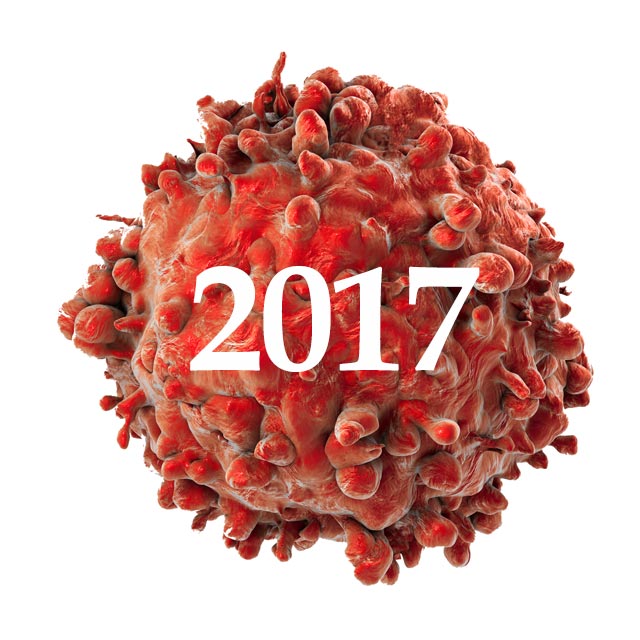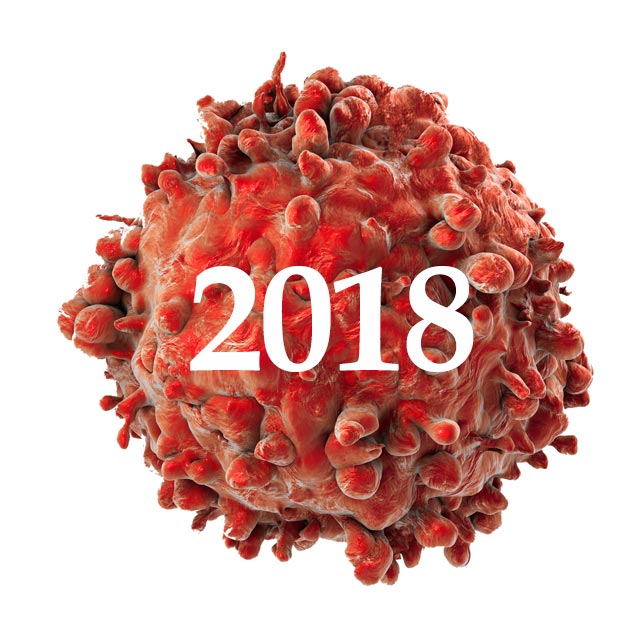10 Modern Milestones in Cancer Research

This list highlights ten major milestones within the field of cancer research since the year 2000.
Efficacy of Imatinib Mesylate Demonstrated in Chronic Myelogenous Leukemia Patients
In 1993, Dr Brian J Druker was approached by Nicholas Lydon, M.D., drug discovery team leader at Ciba-Geigy, whom was set on developing a drug that could ‘switch off’ the enzymes that cause cancer. Druker began screening compounds developed by researchers in Lydon’s lab. One compound, STI571, that would later be known as imatinib, was much more effective than the other compounds. Results of a clinical trial, published in 2001, demonstrated that imatinib mesylate possessed significant antileukemic activity and minimal adverse effects in patients with chronic myeloid leukemia (CML). It has been shown that CML can be caused by BCR-ABL, however, BCR-ABL’s oncogenic activity is directly linked to its tyrosine kinase activity. Imatinib mesylate, a small molecule protein-tyrosine kinase inhibitor, can competitively inhibit BCR-ABL’s kinase activity, hence making it an effective treatment for CML.
Gardasil First Vaccine Approved to Prevent Cervical Cancer
In 2006 the US Food and Drug Administration (FDA) approved Gardasil, the first ever preventative vaccine, for cervical cancer, precancerous genital lesions and genital warts, due to human papillomavirus (HPV) types 6, 11, 16 and 18, in girls and women (9–26 years-of-age). Some HPV types (6 and 11) can cause genital warts and others (types 16 and 18) can cause abnormal cells to develop on the cervix lining. It is possible for these abnormal cells to become cancerous over time. Gardasil received approval for a number of additional indications, since 2006. In 2014 the FDA approved Gardasil 9, which protects against nine types of HPV, five more than the original Gardasil.

Ipilimumab Improves Survival of Advanced Melanoma Patients
Positive results of a Phase III study investigating the efficacy and safety of ipilimumab, for HLA-A*0201–positive patients with unresectable stage III or IV melanoma (N=676), were published in 2010. Patients were randomized 3:3:1 to receive either: ipilimumab plus glycoprotein 100 (gp100) (n=403); ipilimumab (n=137); or gp100 (n=136). Overall survival improved in those administered ipilimumab +/- gp100; 10.0 and 10.1 months, respectively. Patients in the third arm of the trial receiving only gp100 had a median survival of 6.4 months. The study also highlighted that adverse events can be severe, and long lasting but, with appropriate treatment, can be alleviated. This monoclonal antibody was later approved for patients with unresectable or metastatic melanoma (2011).

Sipuleucel-T: The First Therapeutic Vaccine for Cancer
Based on results of the Phase III IMPACT study, the therapeutic cancer vaccine, Provenge® (sipuleucel-T) was approved as a treatment for men with asymptomatic or minimally symptomatic metastatic castrate-resistant (hormone refractory) prostate cancer. Sipuleucel-T is comprised of antigen presenting cells (APCs) along with various other autologous peripheral blood mononuclear cells, that have been activated by PAP-GM-CSF. PAP-GM-CSF is a recombinant protein that is made up of PAP linked to the immune cell activator, granulocyte-macrophage colony stimulating factor (GM-CSF). As an autologous cellular immunotherapy, it works by inducing an immune response, targeting the prostatic acid phosphatase (PAP) antigen, which is expressed in the majority of prostate cancers.

Ado-Trastuzumab Emtansine for HER2-positive Breast Cancer
Amplification of the human epidermal growth factor receptor-2 (HER2) gene is observed in approximately 25% of all breast cancers, causing over-expression of the HER2 receptor kinase on the surface of cancer cells. HER2 activation leads to an intracellular signaling cascade, inducing cell proliferation, invasion and angiogenesis. The antibody-drug conjugate (ADC), ado-trastuzumab emtansine (T-DM1), was approved in 2013 for the treatment of patients with HER2-positive breast cancer who had previously received treatment with trastuzumab and/or a taxane drug. T-DM1 is comprised of the antibody trastuzumab, a thioether linker and the microtubule inhibitor DM1. Upon contact with the HER2 receptor, T-DM1 is internalized and subsequent lysosomal degradation results in the release of DM1-containing cytotoxic catabolites, inhibiting cell proliferation and preventing the formation of microtubules.

FDA Approves Pembrolizumab for Metastatic Melanoma
In September 2014, the FDA granted the approval of the monoclonal antibody, Keytruda® (pembrolizumab), for the treatment of “patients with unresectable or metastatic melanoma and disease progression following ipilimumab and, if BRAF V600 mutation positive, a BRAF inhibitor.” Pembrolizumab boosts the body’s immune response against cancer cells. It acts by binding to the PD-1 receptor, and subsequently prevents the receptor from interacting with both programmed death-ligand PD-L1 and PD-L2. Both PD-L1 and PD-L2 can be upregulated in some tumors and can lead to inhibited immune surveillance of tumors. By blocking the association between the PD-1 receptor and PD-L1/ PD-L2, PD-1 pathway-mediated immune system inhibition is prevented, strengthening the body’s response against cancer.

Analyzing DNA Reveals Four Subtypes of Stomach Cancer
The histological and etiological heterogeneity of gastric cancer has made studying it extremely challenging. However, in 2014, researchers from The Cancer Genome Atlas (TCGA) network identified four subtypes of stomach cancer, based on varying tumor characteristics. Gastric tumors in the first group were positive for Epstein–Barr virus, those in the second subgroup displayed high microsatellite instability, the third were shown to have low levels of somatic copy number alterations (SCNAs) and the fourth tumor subgroup was categorized as ‘chromosomally unstable’ with high levels of SCNAs. These findings, published in Nature, revolutionized the way researchers approach the development of gastric cancer treatments, as it was no longer considered a single disease.

FDA Approves First Gene Therapy Against Cancer
The FDA approved the first gene therapy for cancer in August 2017. The cell-based gene therapy, KymriahTM (tisagenlecleucel) was approved for use in pediatric and young adults with an often-lethal type of blood and bone marrow cancer known as B-cell precursor acute lymphoblastic leukemia (ALL) (relapsed or refractory). This immunotherapy is created by harnessing an individual patient’s own T-cells. These T-cells are collected and genetically modified to include a specific gene that encodes a chimeric antigen receptor (CAR) protein. Expression of this CAR on the surface of the genetically engineered T cells enables them to recognize the CD19 antigen on the leukemia cell surface and allows them to specifically target cancer cells. The CAR T-cells are then reintroduced via infusion into the patient to destroy the cancer cells.

First Approved Therapy of Any Type for Advanced Cutaneous Squamous Cell Carcinoma
Cemiplimab (Libtayo) became the first approved therapy for patients with advanced cutaneous squamous-cell carcinoma (CSCC) – the second most common form of skin cancer. Cemiplimab is a checkpoint inhibitor that targets the PD-1 pathway by binding to the programmed death receptor-1, consequently blocking its interaction with both PD-L1 and PD-L2 ligands. Regulatory approval was granted based on the results of two clinical studies involving 108 patients.

First Ever Checkpoint Immunotherapy Approval for Any Breast Cancer
On March 8, 2019, the FDA granted approval to atezolizumab (Tecentriq®), in combination with nab-paclitaxel chemotherapy, for first-line treatment of patients with PD-L1-positive triple-negative breast cancer that is either unresectable (inoperable) or metastatic. The accelerated approval was based on data from the “Phase III IMpassion130 study”. The study demonstrated that atezolizumab plus nab-paclitaxel significantly reduced the risk of disease worsening or death (PFS) by 40 percent compared with nab-paclitaxel alone (median PFS=7.4 vs. 4.8 months; HR=0.60, 95% CI: 0.48-0.77, p<0.0001) in PD-L1-positive patients, with either unresectable locally advanced or metastatic TNBC. The patients had not received prior chemotherapy for metastatic disease.
Reference: L Mason (2018) 8 Modern Milestones in Cancer Research. Retrieved from https://www.technologynetworks.com/cancer-research/lists/8-modern-milestones-in-cancer-research-298953 [Accessed: May 13, 2019]





